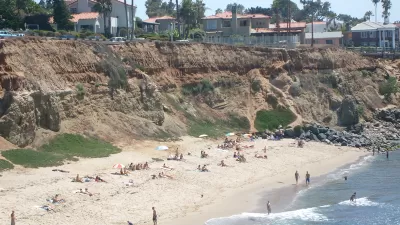The commission spent a significant part of last year in the spotlight. Now, its new director is moving ahead on climate adaptation and resilience efforts as a federal policy change looms.

The California Coastal Commission made waves last year when the dismissal of its longtime leader sparked alarm that the body charged with protecting coastal lands was becoming increasingly pro-development. In an in-depth interview with The Planning Report, the new director—commission veteran Jack Ainsworth—dispels any such notions and points to the bigger threats he sees facing coastal preservation in the United States.
The Trump Administration's plan to permit offshore drilling is "a significant concern," he says, not least because it reflects "a narrative that climate change is not happening and sea-level rise is not an issue.” (In fact, Ainsworth sees sea-level rise as "the most significant planning challenge we have ever faced.")
Another concern: that the administration may move to weaken the Coastal Zone Management Act, which authorizes many of the commission's activities, and cut funding for coastal programs. Until now, Ainsworth says, "Coastal protection has always been a bipartisan issue."
Meanwhile, the commission is soldiering on in service of preserving California's shores—partnering with local governments, the state parks department, and the California Transportation Agency on comprehensive climate adaptation planning. Ainsworth also takes an active interest in housing affordability and transit access, advocating for increased urban density that cautiously avoids impacting sensitive coastal environments.
Providing housing for all people of all income levels along our coastline is critically important. We see a lot of people who have to take long bus rides to get to work in the coastal areas. It is a public access issue, and also an environmental justice issue, to ensure that people who work in those communities are able to live in those communities … It’s also important to create transit connections to get people to the coast who may not be able to afford to drive there.
The Planning Report interview also covers desalination plants coming to Southern California, the latest on the controversial Newport Banning Ranch project, and more.

Maui's Vacation Rental Debate Turns Ugly
Verbal attacks, misinformation campaigns and fistfights plague a high-stakes debate to convert thousands of vacation rentals into long-term housing.

Planetizen Federal Action Tracker
A weekly monitor of how Trump’s orders and actions are impacting planners and planning in America.

Chicago’s Ghost Rails
Just beneath the surface of the modern city lie the remnants of its expansive early 20th-century streetcar system.

Bend, Oregon Zoning Reforms Prioritize Small-Scale Housing
The city altered its zoning code to allow multi-family housing and eliminated parking mandates citywide.

Amtrak Cutting Jobs, Funding to High-Speed Rail
The agency plans to cut 10 percent of its workforce and has confirmed it will not fund new high-speed rail projects.

LA Denies Basic Services to Unhoused Residents
The city has repeatedly failed to respond to requests for trash pickup at encampment sites, and eliminated a program that provided mobile showers and toilets.
Urban Design for Planners 1: Software Tools
This six-course series explores essential urban design concepts using open source software and equips planners with the tools they need to participate fully in the urban design process.
Planning for Universal Design
Learn the tools for implementing Universal Design in planning regulations.
planning NEXT
Appalachian Highlands Housing Partners
Mpact (founded as Rail~Volution)
City of Camden Redevelopment Agency
City of Astoria
City of Portland
City of Laramie





























